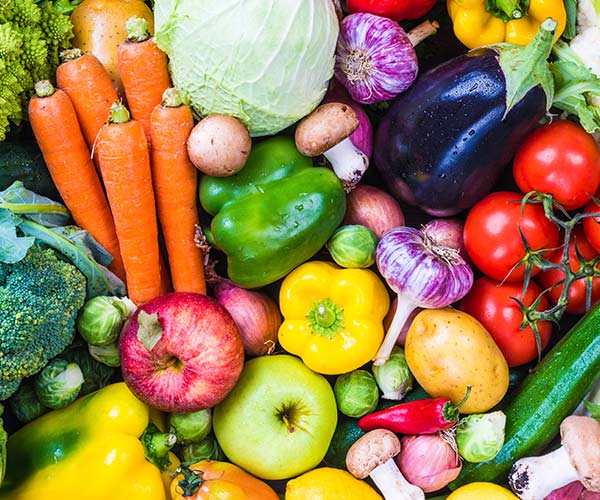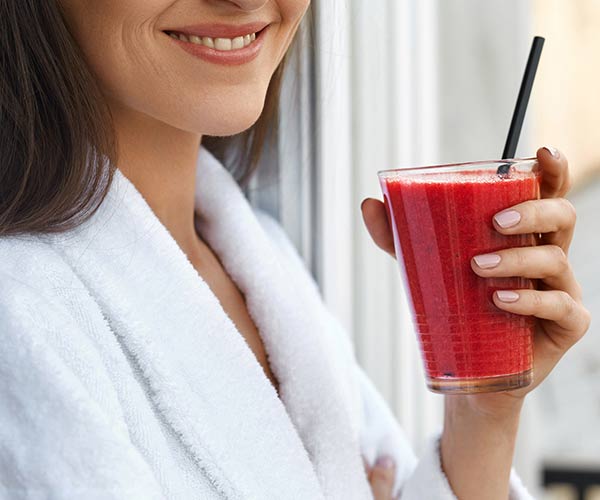by LISA FOGARTY

Shutterstock
As anyone who has ever blown their budget at the grocery store can attest to: it’s important to make and stick to a grocery list. But planning ahead isn’t just important for financial reasons — you’re more likely to make good choices when you consider every single food and beverage you’d like to keep around the house.
But there’s one food that you might still be adding to that list because you assume it’s healthier than it actually is — when, in reality, it couldn’t be less healthy for you.

Shutterstock
For years, and maybe even decades, one bad-for-you food has been marketed as a health food that can take the place of fruits and vegetables. But as our focus becomes more on the dangers of sugar and the importance of eating natural, whole foods, it has become clear that this food has no place in a healthy diet — or on your grocery list.

Fruit Juice
Sure, it has the word “fruit” in it, but fruit juice bears little resemblance to the healthy fruit in which it is derived. And, whether you choose fruit juice brands that are made with corn syrup or those labeled “all-natural,” you’re still consuming an unbelievable amount of sugar from a beverage that provides few nutritional benefits in return.

Shutterstock
How bad is the sugar content in fruit juice?
In a word: bad.
According to Eat This, Not That: “Well, while 100 percent fruit juice is a better pick than high fructose corn syrup-laden drinks like Sunny D, even the all-natural Welch’s Grape Juice still packs up to 36 grams of sugar per cup—or about what you’d get from whipping four Krispy Kreme glazed donuts into a blender.”

Shutterstock
According to a study in the Journal of Clinical Investigation, fructose — which is present in most fruit juices and gives them their sweet taste — is linked to an increase in visceral fat, a.k.a. stubborn fat that clings to the abs and back.

Another negative effect of drinking fructose-spiked fruit juices? They can decrease insulin sensitivity, according to the same study. Insulin controls your blood sugar levels and when your body experiences a decrease in sensitivity to it, your pancreas compensates by producing even more insulin in an attempt to overcome the resistance and lower your blood sugar, according to Healthline.
Forcing your body to compensate for this resistance puts you at risk for type 2 diabetes and obesity.

Shutterstock
If you crave the taste of fruit juice, but are trying to stay away from this beverage, a better bet is to get your fix with fresh fruit. Eating fruits or juicing them (but adding plenty of water and ice so that you don’t go overboard with natural sugars) is a healthier alternative to fruit juice — one that will provide vitamins, minerals, and nutritional benefits.

Shutterstock
As anyone who has ever blown their budget at the grocery store can attest to: it’s important to make and stick to a grocery list. But planning ahead isn’t just important for financial reasons — you’re more likely to make good choices when you consider every single food and beverage you’d like to keep around the house.
But there’s one food that you might still be adding to that list because you assume it’s healthier than it actually is — when, in reality, it couldn’t be less healthy for you.

Shutterstock
For years, and maybe even decades, one bad-for-you food has been marketed as a health food that can take the place of fruits and vegetables. But as our focus becomes more on the dangers of sugar and the importance of eating natural, whole foods, it has become clear that this food has no place in a healthy diet — or on your grocery list.

Fruit Juice
Sure, it has the word “fruit” in it, but fruit juice bears little resemblance to the healthy fruit in which it is derived. And, whether you choose fruit juice brands that are made with corn syrup or those labeled “all-natural,” you’re still consuming an unbelievable amount of sugar from a beverage that provides few nutritional benefits in return.

Shutterstock
How bad is the sugar content in fruit juice?
In a word: bad.
According to Eat This, Not That: “Well, while 100 percent fruit juice is a better pick than high fructose corn syrup-laden drinks like Sunny D, even the all-natural Welch’s Grape Juice still packs up to 36 grams of sugar per cup—or about what you’d get from whipping four Krispy Kreme glazed donuts into a blender.”

Shutterstock
According to a study in the Journal of Clinical Investigation, fructose — which is present in most fruit juices and gives them their sweet taste — is linked to an increase in visceral fat, a.k.a. stubborn fat that clings to the abs and back.

Another negative effect of drinking fructose-spiked fruit juices? They can decrease insulin sensitivity, according to the same study. Insulin controls your blood sugar levels and when your body experiences a decrease in sensitivity to it, your pancreas compensates by producing even more insulin in an attempt to overcome the resistance and lower your blood sugar, according to Healthline.
Forcing your body to compensate for this resistance puts you at risk for type 2 diabetes and obesity.

Shutterstock
If you crave the taste of fruit juice, but are trying to stay away from this beverage, a better bet is to get your fix with fresh fruit. Eating fruits or juicing them (but adding plenty of water and ice so that you don’t go overboard with natural sugars) is a healthier alternative to fruit juice — one that will provide vitamins, minerals, and nutritional benefits.

 . This is who yall put your faith in when it comes to science?people who cant even figure out how good or bad certain foods are for you
. This is who yall put your faith in when it comes to science?people who cant even figure out how good or bad certain foods are for you